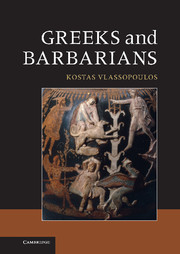Book contents
- Frontmatter
- Contents
- List of Maps and figures
- Acknowledgements
- Note to the reader
- List of Abbreviations
- 1 Introduction
- 2 The Panhellenic world and the world of empires
- 3 The world of networks and the world of apoikiai
- 4 Intercultural communication
- 5 The Barbarian repertoire in Greek culture
- 6 Globalisation and glocalisation
- 7 The Hellenistic world
- 8 Conclusions
- Bibliography
- Index locorum
- Index
7 - The Hellenistic world
Published online by Cambridge University Press: 05 June 2013
- Frontmatter
- Contents
- List of Maps and figures
- Acknowledgements
- Note to the reader
- List of Abbreviations
- 1 Introduction
- 2 The Panhellenic world and the world of empires
- 3 The world of networks and the world of apoikiai
- 4 Intercultural communication
- 5 The Barbarian repertoire in Greek culture
- 6 Globalisation and glocalisation
- 7 The Hellenistic world
- 8 Conclusions
- Bibliography
- Index locorum
- Index
Summary
The Hellenistic period starts with the wars between Alexander’s successors to divide the empire that he conquered and created. The result of these wars was the emergence of a number of states that stretched from the Balkans to modern Pakistan. The Hellenistic period traditionally encompasses the history of these empires and kingdoms from the death of Alexander the Great in 323 until the last of them, the Ptolemaic kingdom of Egypt, succumbed to Rome after the battle of Actium in 31. We have seen how already during the archaic and classical periods Greek soldiers, professionals, intellectuals and artists had served the rulers, satraps and grandees of the empires of the East (pp. 43–52). But the radical difference between the Hellenistic and earlier periods is that now these Greeks were members of a Greco-Macedonian ruling elite; the new empires and kingdoms were ruled by Macedonians, and their courts consisted primarily of Macedonian and Greek military men, administrators, artists, intellectuals and professionals of various skills. For the first time Greeks had come to rule over non-Greeks. This was an important difference and one of the reasons for which the Hellenistic period is being examined separately in this final chapter, rather than being incorporated within the discussions of the previous chapters.
- Type
- Chapter
- Information
- Greeks and Barbarians , pp. 278 - 320Publisher: Cambridge University PressPrint publication year: 2013

